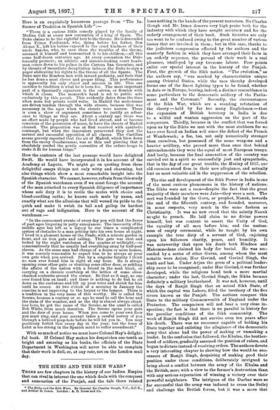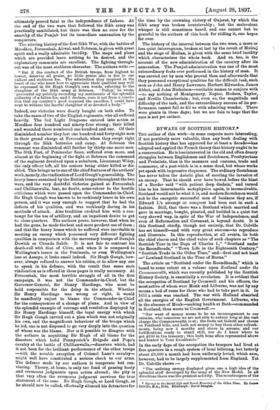THE SIKHS AND THE SIKH WARS.*
THERE are few chapters in the history of our Indian Empire that can rival in interest the one which deals with the conquest and annexation of the Punjab, and the tale there related • The Sikhs and the Sikh Wars. By General Sir Charles Gough, V.C., and Arthur D. lanes. London ; A. D. lanes and Co.
loses nothing in the hands of the present narrators. Sir Charles Gough and Mr. Lines deserve very high praise both for the industry with which they have sought accuracy and for the orderly arrangement of their book. Such histories are only too wont to be confused owing to the great number of various issues that are involved in them ; but in this case, thanks to the judicious compression effected by the authors and the masterly fashion in which they have arranged their facts in an orderly sequence, the perusal of their work is a real pleasure, unalloyed by any tiresome labour. Four points enlist our special interest in the history of the Pun jab. First, the growth of the Sikh nation. "The evolution," as the authors say, "was marked by characteristics unique among Oriental States, while the race thereby developed forms one of the finest fighting types to be found, whether in Asia or in Europe, bearing, indeed, a distinct resemblance in some particulars to the democratic soldiery of the Parlia- ment and the Covenant." Secondly, the circumstances of the Sikh War, which are a standing refutation ef the theory—held by far too many Englishman—that the expansion of British territory in India is due to a wilful and wanton aggression on the part of the conquerors. Thirdly, because in the conflict that was forced upon us by the Sikhs we met with the most stubborn foe we have ever faced on Indian soil since the defeat of the French at Wandewash ; a foe, too, not only numerically stronger than ourselves, but possessed of the same weapons and a heavier artillery, who proved more than once that behind entrenchments they were the equal of most European troops. And lastly, because the final annexation of the country was carried out in a spirit so successfully just and sympathetic, that in the day of our great trouble, the Mutiny of 1857, our old enemies stood firm in their new allegiance, and actually lent us most valuable aid in the suppression of the rebellion.
The rise and development of the Sikh Power in India is one of the most curious phenomena in the history of nations. The Sikhs were not a race—despite the fact that the great majority of their members were Jats—they were a sect. The sect was founded by the Guru, or prophet, Nanuk, towards the end of the fifteenth century, and founded, moreover, in some respects, very much in the same fashion as Christianity. It was no new creed that the saintly Nanuk soaght to preach. He laid claim to no divine powers himself, but was content to assert the Unity of Goa, the equality of all men before him, and the useless- ness of empty ceremonial, while he taught by his own example the true duty of a servant of God, enjoining upon his followers charity, peace, and humility. It was noteworthy that upon his death both Hindoos and Mahommedans claimed his body for burial. He was sac- ceeded by a series of other Gurus, among whom the most notable were Arjun, Hur Govind, and Govind Singh, the tenth and last. Under Arjun the germ of a political leader. ship came to be recognised; under Hur Govind, it was further developed, while the religious bond took a more martial character ; under the last, Govind Singh, the Sikhs became definitely a military brotherhood. It was not, however, until the days of Ranjit Singh that an actual Sikh State, of which the capital was Lahore, filled the territory of the five rivers known as the Punjab. The authors compare this State to the military Commonwealth of England under the Protector. The comparison will not bear a very close in. spection ; the fact is that there is no parallel in history for the peculiar conditions of the Sikh community. The work of Ranjit Singh did not survive even ten years after his death. There was no successor capable of holding his State together and enlisting the allegiance of the democratic army that alone had the power of making or unmaking a leader. In the confusion that followed, the Khalsa, the brother- hood of soldiers, gradually assumed the position of rulers, and began to dictate instead of receiving orders. The authors devote a very interesting chapter to showing how the would-be suc- cessors of Ranjit Singh, despairing of making good their position under these conditions, deliberately intrigued to bring about a conflict between the army of the Khalsa and the British, more with a view to the former's destruction than with any serious expectation of winning a victory over their powerful neighbours. The intrigues of the Durbar were so far successful that the army was induced to cross the Sutlej and challenge the British forces, but it was a move that
ultimately proved fatal to the independence of Lahore. At the end of the two wars that followed the Sikh army was practically annihilated, but there was then no cure for the anarchy of the Punjab but its immediate annexation by the conquerors. The stirring history of the first Sikh War, with the battles of Moodkee, Ferozeshah, Aliwal, and Sobraon, is given with great spirit and a really admirable lucidity. The maps and plans which are provided leave nothing to be desired, and the explanatory comments are excellent. The fighting through- out was of the most stubborn character. The authors write :—
'But if the conduct of the British troops, from highest to lowest, deserves all praise, no little praise also is due to our valiant and stubborn foe. The admiration they inspired in the heart of one who knew how to appreciate their qualities may well be expressed in Sir Hugh Gough's own words, referring to the slaughter of the Sikh army at Sobraon. 'Policy,' he wrote, prevented my publicly recording ray sentiments of the splendid gallantry of a fallen foe, and I declare, were it not from a convic- tion that my country's good required the sacrifice, I could have wept to witness the fearful slaughter of so devoted a body.'"
Indeed, our victories were dearly bought on both sides. To take the cases of two of the English regiments, who all suffered heavily. The 3rd Light Dragoons entered into action at Moodkee four hundred and ninety-four strong ; their killed and wounded there numbered one hundred and one. Of their diminished number they lost one hundred and forty-eight men
in their grand charge at Ferozeshah, when they swept right through the Sikh batteries and camp. At Sobraon the remnant was diminished still farther by thirty-one more men The 50th Foot, of Peninsular fame, suffered even more, and almost at the beginning of the fight at Sobraon the command of the regiment devolved upon a subaltern, Lieutenant Wiley, the only officer left, all his seniors being either killed or dis- abled. This brings us to one of the chief features of the authors' work, namely, the vindication of Lord Gough's generalship. The heavy losses sustained by the British troops throughout the two
wars, and the very doubtful victories gained at Ferozeshah
and Chillianwalla, lent, no doubt, some colour to the hostile criticisms which were passed upon the Commander-in-Chief. Sir Hugh Gough was kuown to be recklessly brave in his own
person, and it was easy enough to suggest that he had the defects of his qualities, and was recklessly daring in his methods of attack. Also tradition credited him with a con- tempt for the use of artillery, and an impatient desire to get
to close quarters. The authors prove, however, that when he had the guns, he made the best and most prudent use of them ;
and that the heavy losses which he suffered were inevitable in meeting an enemy which possessed very different fighting qualities in comparison with the mercenary troops of Surajah Dowlah or Chancia Sahib. It is not fair to contrast his death-roll with that of Clive, and when it is compared to Wellington's losses in the Peninsula, or even Wellington's loss at Assaye, it looks small indeed. Sir Hugh Gough, how- ever, always refused to answer his critics, or to allow any one to speak in his defence, with the result that some such vindication as is offered in these pages is really necessary. At Ferozeshah, the most terrible struggle of all in the first campaign, it was not the Commander-in-Chief, but the Governor-General, Sir Henry Hardinge, who must be held responsible for the delay in the attack. Whether Sir Henry Hardinge was wrong or right, it would be manifestly unjust to blame the Commander-in-Chief for the consequences of a change of plans. And in view of the splendid example of courage and resolution displayed by Sir Henry Hardinge himself, the loyal energy with which Sir Hugh Gough carried out a plan which was not originally his own, and the magnificent behaviour of the troops which he led, one is not disposed to go very deeply into the question of whose was the blame. Nor is it possible to disagree with the authors in acquitting Sir Hugh of all blame for the disasters which befel Pennycuick's Brigade and Pope's cavalry at the battle of Chillianwalla,—disasters which, had
it not been for the brilliant performance of the other troops —with the notable exception of Colonel Lane's cavalry—
might well have constituted a serious check to our arms.
The defence made by our authors is temperate but con- vincing. Theory, at home, is only too fond of passing hasty and erroneous judgments upon action abroad ; the pity is that very often the erroneous judgment survives the true statement of the case. Sir Hugh Gough, or Lord Gough, as he should now be called, effectually silenced his detractors for the time by the crowning victory of Gujerat, by which the Sikh army was broken irretrievably ; but the malevolent whisper is still sometimes heard, and one cannot but be grateful to the authors of this book for stifling it, one hopes for ever.
The history of the interval between the two wars, a more or less quiet interregnum, broken at last by the revolt of Mulraj and the siege of Malian, is given with the same brief lucidity which characterises the whole book. And so, too, is the account of the new administration of the country after its annexation. The Panja,b administration was one of the most extraordinary feats ever performed in the history of man. It was carried out by men who proved then and afterwards that they possessed exceptional qualities for the difficult task, such men as John and Henry Lawrence, Herbert Edwardes, James Abbot, and John Nicholson—veritable names to conjure with —to say nothing of Montgomery, Napier, Hodson, Taylor, and Neville Chamberlain ; but, even so, the magnitude and difficulty of the task, and the extraordinary success of its per- formance, cannot fail to fill us with admiring wonder. There were giants in those days ; but we are fain to hope that the race is not yet extinct.



































 Previous page
Previous page